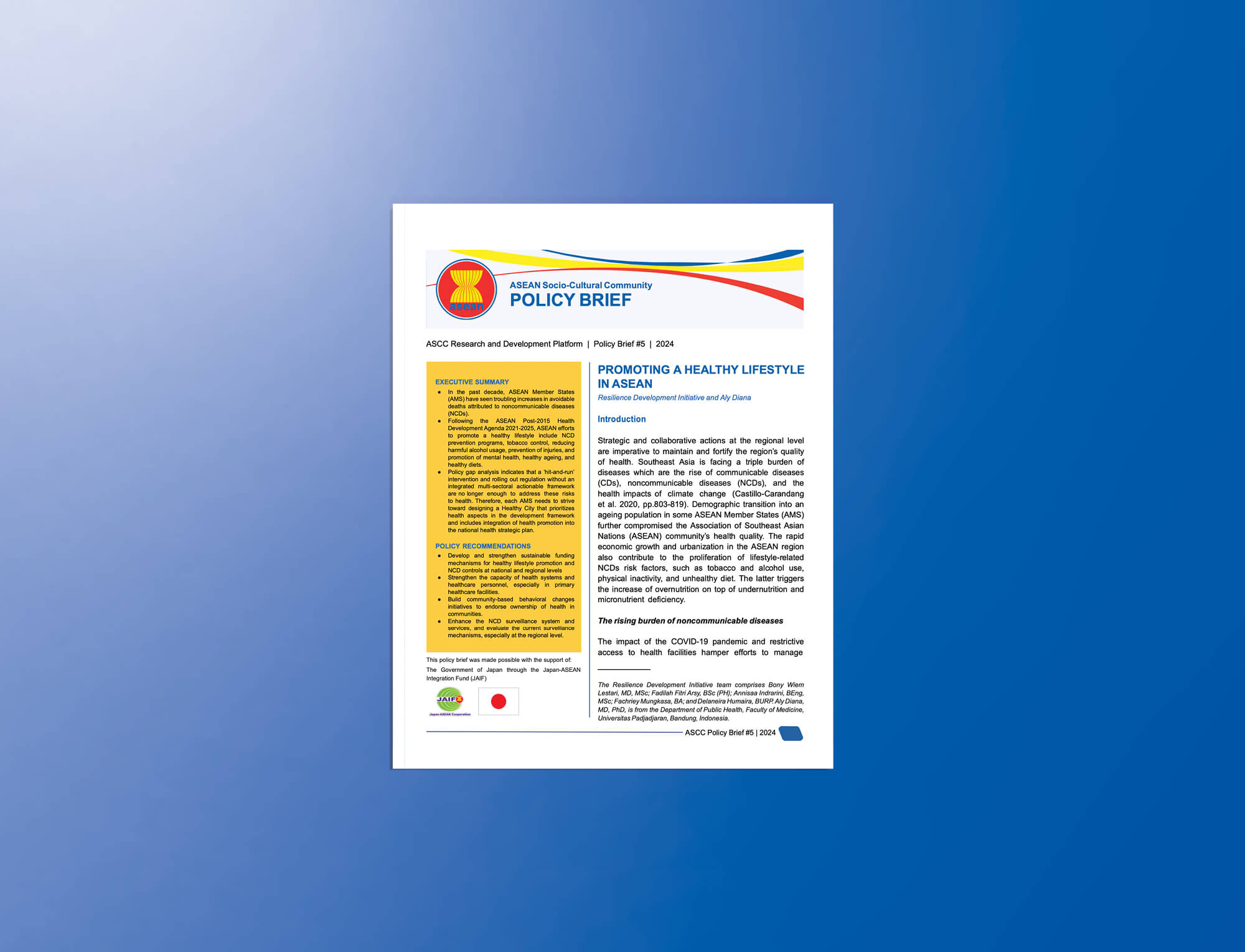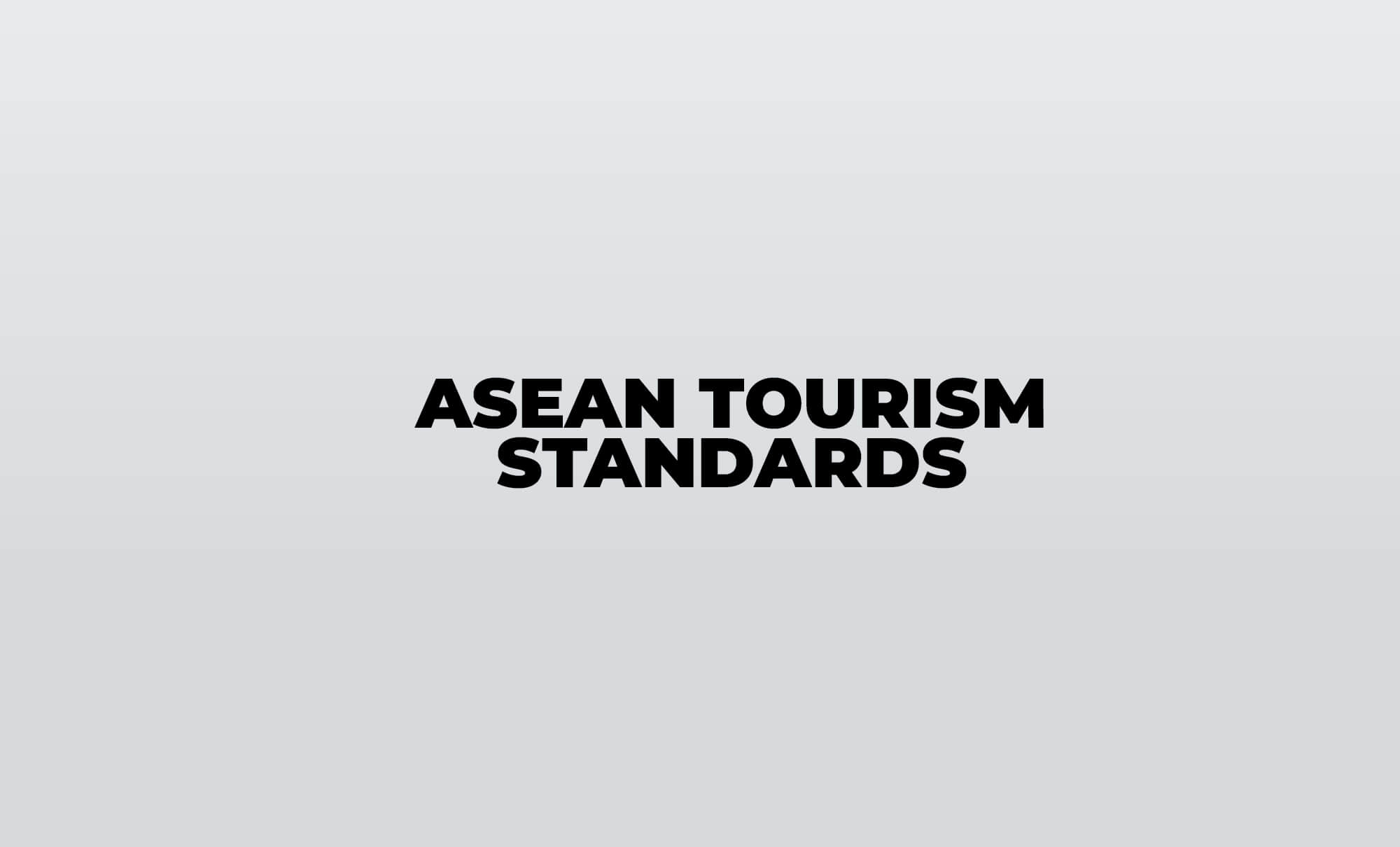





by Resilience Development Initiative and Aly Diana
Strategic and collaborative actions at the regional level are essential to maintain and bolster the region’s health quality. A product of the ASCC Research and Development Platform on Public Health Emergencies, this policy brief delves into the critical role of promoting healthy lifestyles in preventing noncommunicable diseases (NCDs) and fortifying ASEAN's health system.
In many ASEAN Member States, NCDs are the primary cause of mortality, with cardiovascular diseases, diabetes, cancers, and chronic respiratory diseases collectively accounting for over 80 per cent of NCD-related early deaths. The premature mortality of numerous young individuals due to NCDs carries significant social and economic consequences, like lost productivity, particularly in low and middle-income nations. Additionally, there exists a notable connection between mental illnesses and NCDs, as they often share related risk factors and mutually influence disease progression, thereby exacerbating the severity of health, social, and economic consequences.
The ASCC Policy Brief No. 5 (2024), “Promoting a Healthy Lifestyle in ASEAN,” necessitates a comprehensive and multi-sectoral approach to addressing these challenges. Initiatives promoting healthy lifestyles are pivotal in empowering individuals and communities to take charge of their health. By addressing modifiable behavioural risks such as tobacco and alcohol use, physical inactivity, and unhealthy diets, ASEAN aims to mitigate the prevalence of NCDs and enhance overall health outcomes.
Challenges in promoting a healthy lifestyle
Efforts to curb tobacco and alcohol consumption in ASEAN have shown progress, yet challenges persist. Despite a decline in tobacco use over the past decades, the rise of electronic nicotine delivery systems poses new hurdles, particularly among youth. Strengthening existing policies, such as expanding smoking bans and improving cessation programmess, remains crucial.
The increasing mortality rates from road traffic injuries present another pressing public health issue in ASEAN. Member States have implemented multi-sectoral approaches, integrating measures into urban development and prioritising post-crash responses. However, further actions are needed to reduce the number of incidents effectively.
Occupational safety, mental health, and healthy ageing are also significant concerns. While policies and programmes exist to promote occupational health and support older people, challenges like long working hours and mental health issues remain. Addressing these issues requires intensified efforts and integrated approaches.
Furthermore, the triple burden of malnutrition—overeating, undernutrition, and micronutrient deficiencies—remains a formidable challenge. Despite various initiatives, limited resources and inadequate monitoring hinder progress in these areas. Future initiatives must prioritise community-based programmes to promote healthy diets and sustainable food systems.
Recommendations
In tackling the challenges posed by NCDs in ASEAN, several strategic actions are recommended by the Policy Brief:
- Develop a sustainable funding mechanism
Several actions can be implemented to accelerate funding such as conducting funding landscape analysis, scaling up joint funding mechanisms, enhancing technical and policy support, mobilising domestic resources through public-private partnerships, and enabling community engagement. These actions are crucial for improving health systems and implementing new initiatives effectively.
- Strengthen the capacity of health systems and healthcare personnel, especially in primary healthcare facilities
It is important to evaluate healthcare systems and healthcare providers’ capabilities to enhance services and training modules, focusing on the prevention and early detection of NCDs. Strengthening efforts in primary healthcare facilities is crucial for broader coverage and impactful prevention. Initiatives may include joint training with other regions, facilitating multidisciplinary treatment, and equipping facilities with standardised resources and digital reporting systems.
- Build community-based behavioural initiatives
Community-based interventions, such as school interventions, can promote behavioural changes, particularly in nutrition and mental health. Policies that strengthen these programmes enhance community engagement and ownership of health, facilitating the integration of new healthy behaviours. These policies may involve community mobilisation through training health workers, providing social protection via health insurance and cash transfers, and empowering community leaders to implement health programmes.
- Enhance surveillance system and monitoring and evaluation mechanism
Several surveillance initiatives for promoting healthy lifestyles include integrating health applications for NCD control into national health surveillance systems, developing a harmonised Nutrition Surveillance System in ASEAN, implementing traffic management surveillance, regulating evaluation and reporting of occupational health systems, and establishing a proper mental health surveillance system.
This Policy Brief is a publication of the ASEAN Socio-Cultural Community Department of the ASEAN Secretariat. The views expressed in this publication are those of the author(s) and do not necessarily reflect the views of ASEAN and ASEAN Member States, the ASEAN Secretariat, and ASEAN Dialogue Partners. For more information about the ASCC Research and Development Platforms, contact the ASCC Analysis Division at ASCCAD@asean.org.
The Policy Brief can be downloaded from: https://asean.org/serial/promoting-a-healthy-lifestyle-in-asean/









